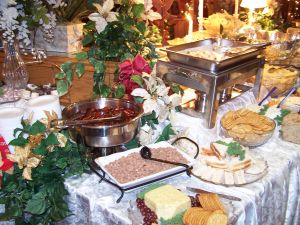Holidays And Celebrations – Reprise
We’ve entered into what many consider to be “the holiday season.” After all Halloween is soon followed in the US by Thanksgiving, which gives way to Christmas, and then to New Years. In light of the season, I thought a series of posts on the holidays might be appropriate. I’m kicking it off with an edited version of a post that first appeared here in 2012. Some of you may remember it.
– – – – –
 The topic of holidays and celebrations in speculative fiction fits the time of year. And for some reason, the season spurs me to pick up a fantasy that I’ve loved. Some years its The Lord of the Rings. Others its Narnia. Once I pulled out The Chronicles of Prydain. Not long ago I re-read Harry Potter.
The topic of holidays and celebrations in speculative fiction fits the time of year. And for some reason, the season spurs me to pick up a fantasy that I’ve loved. Some years its The Lord of the Rings. Others its Narnia. Once I pulled out The Chronicles of Prydain. Not long ago I re-read Harry Potter.
No matter what your opinion of the books theologically, I think there’s a lot to appreciate regarding the world J. K. Rowling constructed. Basically she took the familiar (English boarding schools) and superimposed the imagined (wizardry). Hence, the students had a regular routine of classes—not of English and math and science, but of Potions and Herbology and Defense against the Dark Arts.
In addition to appropriately titled textbooks and library references, such as Encyclopedia of Toadstools and The Book of Charms & Spells and homework assignments and tests that involved magic, Rowling added another element that enriched her worldbuilding—holidays and celebrations. Primarily she used the same formula for these as she did for the classes, interweaving the familiar with the imagined.
 Consequently, in various Harry Potter books, Christmas and Halloween feature prominently, along with decorations and vacation breaks and presents and parties. This celebration of the familiar grounds the books in this world.
Consequently, in various Harry Potter books, Christmas and Halloween feature prominently, along with decorations and vacation breaks and presents and parties. This celebration of the familiar grounds the books in this world.
At the same time, Rowling added peculiarly magical events such as the Quiddich World Cup and the Tri-Wizard Tournament, with the accompanying ball to honor the school champions, that gave the world a rich uniqueness.
Certainly much of the activity surrounding these events is “borrowed” from such real life activities as soccer’s World Cup and perhaps the Olympics, but Rowling, as she did with the school elements, adds peculiar “wizardly” aspects. For example, during one Halloween celebration, pumpkins carved into jack-o-lanterns are so large they appear to have been created by engorgement enchantments.
 Rowling was not alone in making use of this-world holidays. C. S. Lewis created a powerful, and Christian, message in The Lion, the Witch, and the Wardrobe by referencing the fact that Narnia suffered under a never-ending winter–always winter and never Christmas. One of the signs that Aslan had returned, in fact, was the appearance of Father Christmas (most commonly called Santa Claus here in the US).
Rowling was not alone in making use of this-world holidays. C. S. Lewis created a powerful, and Christian, message in The Lion, the Witch, and the Wardrobe by referencing the fact that Narnia suffered under a never-ending winter–always winter and never Christmas. One of the signs that Aslan had returned, in fact, was the appearance of Father Christmas (most commonly called Santa Claus here in the US).
As I recall, in the same book the characters later enjoyed a celebration reminiscent of the May Day festivities around a Maypole.
Holidays and celebrations seem to be a staple in society. Many pagan cultures held festivals and commemorations, some connected to their religious beliefs, and certainly Western society under the influence of Christianity fostered holidays consistent with the tenets of their faith. Consequently, novels that incorporate familiar festivities seem anchored in reality.
I tend to think this element of worldbuilding is under-utilized, however. Or maybe I’m oblivious to its use. Help me out. What novels do you recall that make use of either familiar celebrations or holidays or that create their own unique festivities? How do you think their use contributed to the story?






























Share your fantastical thoughts.